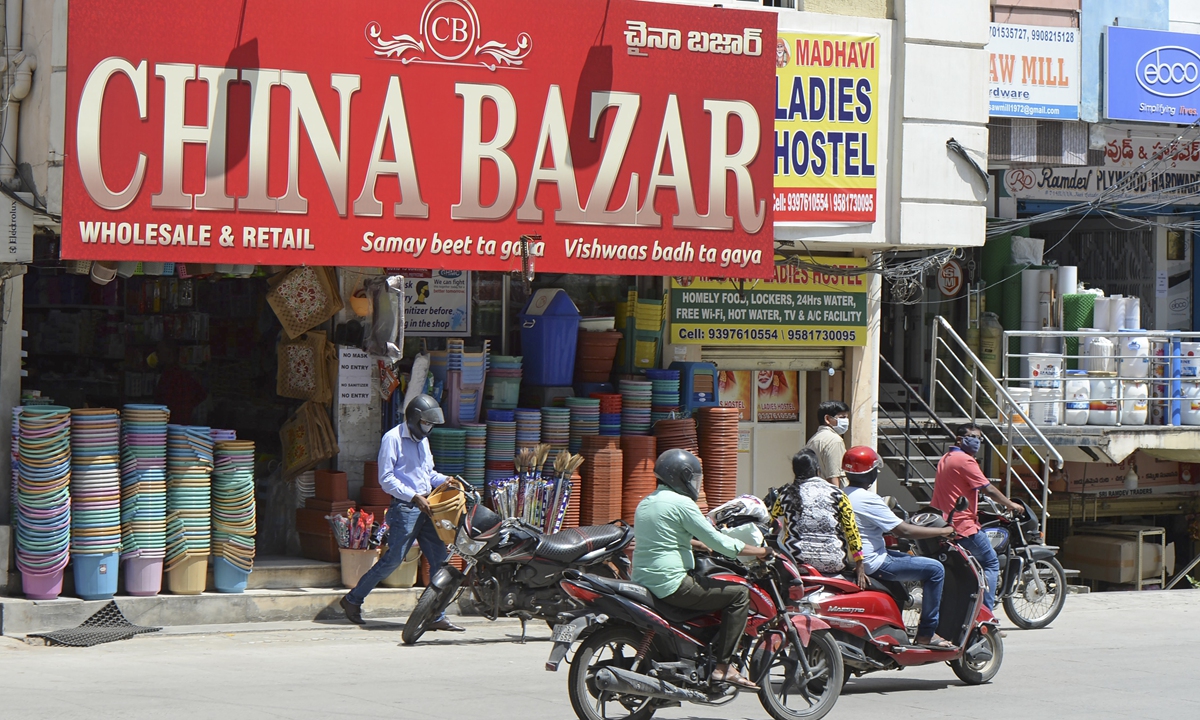India's anti-China movies may trigger extreme nationalism: experts
By Li Qiao Source: Global Times Published: 2020/8/5 0:03:13

A customer holds plastic buckets as he comes out of China Bazar, a shop selling Chinese made products, in Hyderabad on June 24, 2020. Photo: AFP
Chinese observers and netizens are concerned Indian films are stirring up heated nationalism and anti-China sentiment with false and exaggerated plot not respecting the facts, after Indian actor-producer Ajay Devgn recently announced he will soon start casting for a movie about the border clash between China and India in the Galwan Valley.
As the past Indian movies have overly glorified Indian soldiers and vilified Chinese soldiers, Chinese experts and many netizens suspect Devgn's film will again ignore the truth.
China's Foreign Ministry spokesperson Zhao Lijian revealed the details about the border clash at a press conference on June 24, stating that the Indian border troops illegally crossed the Line of Actual Control (LAC) first, violated the agreement and made provocations first, breached international norms to launch attacks.
The dramatic feature about the border clash is sure to portray India as the innocent victim and China as its enemy. If Indian people believe the film's falsehoods and become hostile to China, it will hinder the resumption of friendly communication between the two countries. But sadly, the Modi government seems intent on supporting this approach, Hu Zhiyong, a research fellow at the Institute of International Relations of the Shanghai Academy of Social Sciences, told the Global Times on Monday.
The Modi government, which came to power on a base of grassroots votes, hopes to cover up the significant impact of the epidemic on India's economy through populist campaigns such as "Boycott Made in China" and divert the huge discontent caused by domestic conflicts. India's government, of course, is sympathetic to films that inspire strong "patriotic sentiments," Hu said.
False and distorted plot
Chinese netizens have ridiculed the exaggerated plots of war movies made in India.
In the movie Subedar Joginder Singh, not a single bullet from the Chinese army can hit a brave Indian soldier. However, as long as Singh shoots, air planes are hit and down, Chinese audience mocked.
Story of Indian movie World War III (2016) is based on the premise that only India and China are world superpowers in 2022. Fearing India's rapid development and rise, China unilaterally launches a war against India on August 7, 2022, which almost turns into World War III and ends with the intervention of other countries. India completely defeats China by the end of the movie.
In India-made anti-China movies, Chinese soldiers always look shabby, while Indian soldiers are tall and mighty. Indian soldiers are even invulnerable to bullets. Some of the Chinese soldiers in the movies are even played by Vietnamese and speak Vietnamese.
Such exaggerated plots are ridiculous and opposite to the facts, as China has built up modern army that is stronger than India's, Hu said.
Although the plot is extremely dramatic, even anti-scientific, Indian audiences seem to enjoy these movies. Subedar Joginder Singh gained 7.2 on media review site IMDb.
Anti-scientific plots like killing people with chickens, cutting each other's necks with bananas instead of knives, and throwing cars toward helicopters with their bare hands are scenes from Indian movies. With these superpowers it's not surprising that Indian soldiers can lift tanks with their bare hands, Chinese netizens mocked.
Ajay Devgn is a famous Indian Bollywood actor who was known by Chinese audience for a thriller film named Drishyam in 2015 which received an 8.5 score and 117,000 reviews on Chinese media review platform Douban.
Triggering nationalism sentiment
"Anti-China films that play up nationalism have a market in India and film companies will shoot whatever subject an audience wants to see," Shi Wenxue, Beijing-based film critic told the Global Times on Monday.
Shi believes that the money behind such anti-China films, is also partly driven by political appeals from political parties and related conglomerates.
Hu Zhiyong noted that against the backdrop of increasingly frosty relations between China and the US, the Modi government has taken the initiative to cooperate with the Trump administration and use all means to slander China. The economic ban on Chinese technology companies is reflected in the cultural industry's use of films and television dramas to portray China as an enemy.
"Shaping China's image as the enemy in films will trigger anti-China sentiment in India and hurt the feelings of Chinese and Indian people, which would not be conducive to mutual ties," Hu said. Instead of intensifying anti-Chinese sentiment, India's film industry should promote cultural exchanges between the two countries.
"I hope Indian audiences won't believe such exaggerated plots and hate China, but think about bilateral relations independently," a 28-year-old movie lover from Northeast China's Jilin Province who asked not to be identified told the Global Times on Monday.
Some Chinese movies also have overly dramatic plots, which are controversial. However, the Chinese government has been taking measures to curb such dramas in recent years, rather than tolerate the exaggerated plot.
"Most Chinese audiences hold the same attitude with me toward those exaggerated and overly dramatic plots in some anti-Japanese TV series," said the movie lover from Northeast China, which suffered a lot during the Sino-Japanese war.
The State General Administration of Press, Publication, Radio, Film and Television released an official announcement on July 16 again banning TV dramas about China's anti-Japanese War that violates common sense, fails to respect the history, and is excessively dramatic.
RELATED ARTICLES:
Posted in: FILM